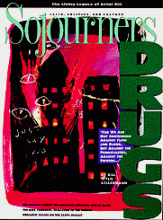A recent study by researchers at the National Cancer Institute, the Centers for Disease Control, and the Washington, D.C. Commission on Public Health found that AIDS cases in the capital likely will triple within five years. From a total of 3,500 cases last year, 10,000 District residents are expected to have AIDS by the mid-l990s.
This preview of Washington, D.C.'s immediate future constitutes more than a wake-up call; it is a fire alarm that should shake us out of our somnolence and neglect toward the pandemic that grips this city, the entire United States, and the rest of the world. The capital gives witness to a deadly disease now present in 163 countries and, according to World Health Organization projections, destined to infect as many as 40 million people by the year 2000.
Those working directly with AIDS sufferers—particularly those in the gay community—have known the extent of the crisis for years and have desperately tried to focus society's attention on it. Today the virus cuts across all lines in our society. While still devastatingly high among homosexual and bisexual men, the number of new AIDS cases among heterosexuals in Washington, D.C., will explode by 1995, according to the study; drug users will account for more than half of all new cases. The number of D.C. children with AIDS is expected to grow from about 500 now to nearly 1,300 by 1996.
These projections give serious pause to those involved in caring for persons who are HIV positive or have AIDS. One clinical psychologist with an already full case load, on top of group work and supervisory responsibilities, wonders if his burden—and that of others in similar positions—will triple in the next five years.
Read the Full Article
